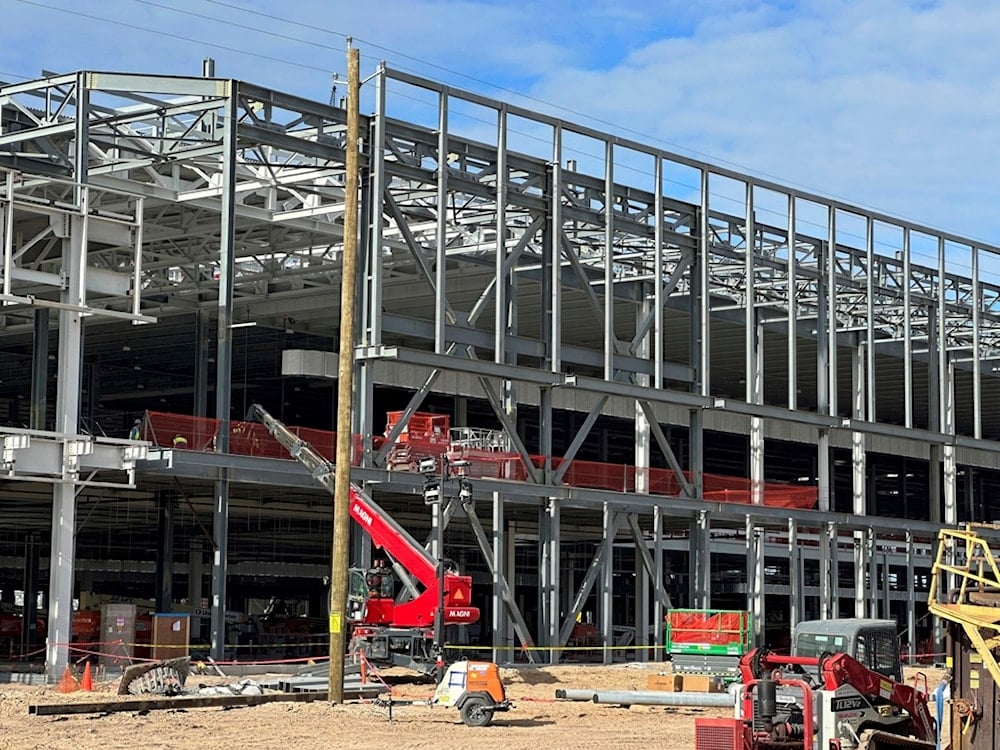South Korea protests US detention of 450 factory workers
US immigration detains 450 workers, including 30 South Koreans, at Hyundai-LG Georgia plant, as Seoul raises concerns over citizens’ rights and investments.
-

A factory building is under construction at Hyundai's first US plant for manufacturing electric vehicles on Wednesday, October 25, 2023, in Ellabell, Georgia (AP)
South Korea’s foreign ministry confirmed Saturday that US immigration authorities detained 450 workers, including more than 30 South Korean nationals, during a large-scale raid at a battery factory construction site in the state of Georgia.
The facility, jointly operated by Hyundai Motor and LG Energy Solution, was targeted as part of an investigation into undocumented labor, according to officials in Seoul.
Foreign ministry spokesperson Lee Jae-won said Seoul had conveyed its concerns to Washington through the US embassy, stressing that “the economic activities of our companies and the rights of our citizens must not be unfairly violated.”
Monitoring developments on the ground
The ministry added that it had dispatched staff from the South Korean embassy in Washington and its consulates in Atlanta to the site and set up a task force to monitor developments on the ground.
The incident comes amid heightened sensitivity over South Korea’s vast investment in the US. In July, Seoul pledged $350 billion in spending partly aimed at offsetting threats by President Donald Trump to impose new tariffs.
South Korean firms, including Hyundai and LG, have invested heavily in US-based factories to expand their share of the American market and shield themselves from potential trade barriers.
Trump tarrifs South Korean imports
Trump announced that his administration would impose a 15% tariff on South Korean imports, stepping back from a previously proposed 25% rate. The move comes as part of a broader agreement aimed at defusing trade tensions with one of Washington’s key Asian allies and major economic partners.
The deal was revealed shortly after Trump hosted South Korean officials at the White House, and landed amid a flurry of trade developments ahead of Trump’s self-imposed August 1 deadline, by which a new set of tariffs was expected to take effect. Until now, imports from South Korea, renowned for its electronics, automobiles, and steel, had faced the threat of significantly steeper levies.
"I am pleased to announce that the United States of America has agreed to a Full and Complete Trade Deal with the Republic of Korea," Trump declared on his Truth Social account.
The agreement also marked a major early test for South Korea’s new president, Lee Jae Myung, who took office in June following a snap election. Lee welcomed the outcome, saying it provided much-needed clarity for exporters and ensured tariffs were either on par with or lower than those faced by other trading nations. "We have crossed a big hurdle," Lee wrote in a Facebook post. Trump, in turn, announced that Lee would make his first official visit to the White House "within the next two weeks."
Greater access for US goods in South Korea
As part of the package, South Korea committed to investing $350 billion in the United States, focusing on projects selected by Trump himself. The country also agreed to purchase $100 billion worth of American energy products.
Trump further claimed that South Korea would allow greater market access for US goods, including cars and agricultural products, without levying import duties.
However, South Korean officials clarified that key domestic markets such as rice and beef would remain protected. Talks over Washington’s concerns regarding food safety regulations were said to be ongoing.
"We avoided the worst and chose the next best," commented Cheong In-kyo, a former South Korean trade minister. He cautioned that the ultimate impact of the deal would hinge on the specifics of the investment pledges. "Depending on how and where the $350 billion will be spent, this fund will be looked at differently."

 5 Min Read
5 Min Read








